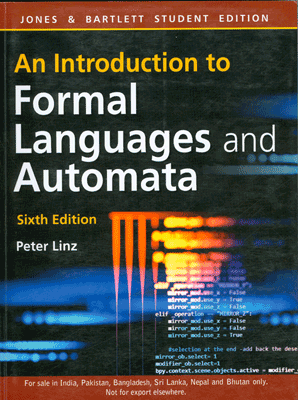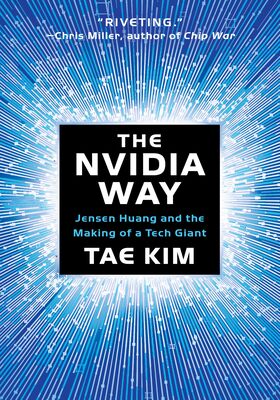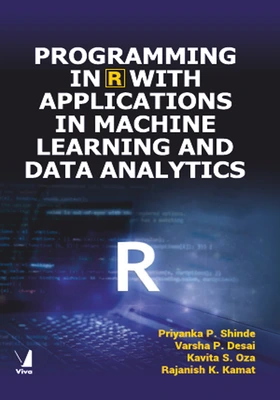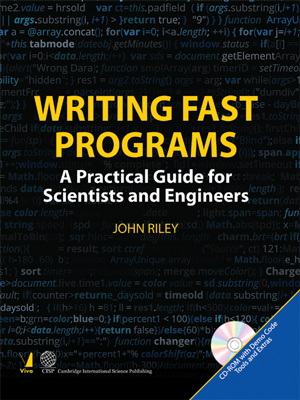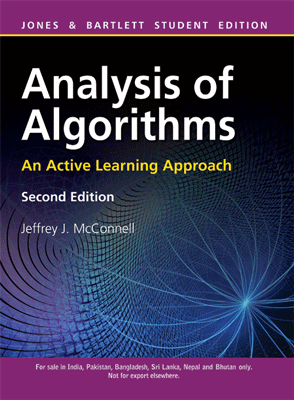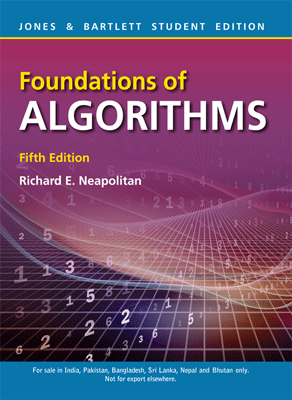An Introduction to Formal Languages and Automata, 6/e
An Introduction to Formal Languages and Automata, 6/e
₹715.50 ₹795.00 Save: ₹79.50 (10%)
Go to cartISBN: 9789384323219
Bind: Paperback
Year: 2019
Pages: 464
Size: 178 x 229 mm
Publisher: Jones & Bartlett Learning
Published in India by: Jones & Bartlett India
Exclusive Distributors: Viva Books
Sales Territory: India, Nepal, Pakistan, Bangladesh, Sri Lanka, Bhutan
Description:
An Introduction to Formal Languages and Automata, Sixth Edition, provides an accessible, student-friendly presentation of all the material essential to an introductory Theory of Computation course. Written to address the fundamentals of formal languages, automata, and computability, the text is designes to familiarize students with the foundations and principles of computer science and to strengthen the students ability to carry out formal and rigorous mathematical arguments. The author, Peter Linz, continues to offer a straightforward, uncomplicated treatment of formal languages and automata and avoids excessive mathematical detail allowing students to focus on and understand the key underlying principles.
- An accesible approach allows students to clearly understand key content while retaining the appropriate mathematical notations and theorems requrired for the course
- New Chapter Synopses, found at the beginning of each chapter, recap important concepts found in the text
- Every major idea is preceded by a motivating example, drawn from applications, that introduces the concept and illustrates its usefulness
- New Exercises added throughout are more closely tied to examples in the text
- An enchanced Instructor's Manual includes more detailes solutions to all problems found in the text
Target Audience:
Written to address the fundamentals of formal languages, automata, and computability, An Introduction to Formal Languages and Automata provides an accessible, student-friendly presentation of all material essential to an introductory Theory of Computation course.
Contents:
Preface
1. Introduction to the Theory of Computation • Mathematical Preliminaries and Notation • Sets • Functions and Relations • Graphs and Trees • Proof Techniques • Three Basic Concepts • Languages • Grammars • Automata • Some Applications*
2. Finite Automata • Deterministic Finite Accepters • Languages and Dfa's • Regular Languages • Nondeterministic Finite Accepters • Definition of a Nondeterministic Accepter • Why Nondeterminism • • Equivalence of Deterministic and Nondeterministic Finite Accepters • Reduction of the Number of States in Finite Automata*
3. Regular Languages and Regular Grammars • Regular Expressions • Formal Definition of a Regular Expression • Languages Associated with Regular Expressions • Connection Between Regular Expressions and Regular Languages • Regular Expressions Denote Regular Languages • Regular Expressions for Regular Languages • Regular Expressions for Describing Simple Patterns • Regular Grammars • Right- and Left-Linear Grammars • Right-Linear Grammars Generate Regular Languages • Right-Linear Grammars for Regular Languages • Equivalence of Regular Languages and Regular Grammars
4. Properties of Regular Languages • Closure Properties of Regular Languages • Closure under Simple Set Operations • Closure under Other Operations • Elementary Questions about Regular Languages • Identifying Nonregular Languages • Using the Pigeonhole Principle • A Pumping Lemma
5. Context-Free Languages • Context-Free Grammars • Examples of Context-Free Languages • Leftmost and Rightmost Derivations • Derivation Trees • Relation Between Sentential Forms and Derivation Trees • Parsing and Ambiguity • Parsing and Membership • Ambiguity in Grammars and Languages • Context-Free Grammars and Programming Languages
6. Simplification of Context-Free Grammars and Normal Forms • Methods for Transforming Grammars • A Useful Substitution Rule • Removing Useless Productions • Removing • -Productions • Removing Unit-Productions • Two Important Normal Forms • Chomsky Normal Form • Greibach Normal Form • A Membership Algorithm for Context-Free Grammars*
7. Pushdown Automata • Nondeterministic Pushdown Automata • Definition of a Pushdown Automaton • The Language Accepted by a Pushdown Automaton • Pushdown Automata and Context-Free Languages • Pushdown Automata for Context-Free Languages • Context-Free Grammars for Pushdown Automata • Deterministic Pushdown Automata and Deterministic Context-Free Languages • Grammars for Deterministic Context-Free Languages*
8. Properties of Context-Free Languages • Two Pumping Lemmas • A Pumping Lemma for Context-Free Languages • A Pumping Lemma for Linear Languages • Closure Properties and Decision Algorithms for Context- Free Languages • Closure of Context- Free Languages • Some Decidable Properties of Context-Free Languages
9. Turing Machines • The Standard Turing Machine • Definition of a Turing Machine • Turing Machines as Language Accepters • Turing Machines as Transducers • Combining Turing Machines for Complicated Tasks • Turing's Thesis
10. Other Models of Turing Machines • Minor Variations on the Turing Machine Theme • Equivalence of Classes of Automata • Turing Machines with a Stay-Option • Turing Machines with Semi-Infinite Tape • The Off-Line Turing Machine • Turing Machines with More Complex Storage • Multitape Turing Machines • Multidimensional Turing Machines • Nondeterministic Turing Machines • A Universal Turing Machine • Linear Bounded Automata
11. A Hierarchy of Formal Languages and Automata • Recursive and Recursively Enumerable Languages • Languages That Are Not Recursively Enumerable • A Language That Is Not Recursively Enumerable • A Language That Is Recursively Enumerable but Not Recursive • Unrestricted Grammars • Context-Sensitive Grammars and Languages • Context-Sensitive Languages and Linear Bounded Automata • Relation Between Recursive and Context-Sensitive Languages • The Chomsky Hierarchy
12. Limits of Algorithmic Computation • Some Problems That Cannot Be Solved by Turing Machines • Computability and Decidability • The Turing Machine Halting Problem • Reducing One Undecidable Problem to Another • Undecidable Problems for Recursively Enumerable Languages • The Post Correspondence Problem • Undecidable Problems for Context-Free Languages • A Question of Efficiency
13. Other Models of Computation • Recursive Functions • Primitive Recursive Functions • Ackermann's Function • Recursive Functions • Post Systems • Rewriting Systems • Matrix Grammars • Markov Algorithms • L-Systems
14. An Overview of Computational Complexity • Efficiency of Computation • Turing Machine Models and Complexity • Language Families and Complexity Classes • The Complexity Classes P and NP • Some NP Problems • Polynomial- Time Reduction • NP-Completeness and an Open Question
Appendix A Finite-State Transducers • A General Framework • Mealy Machines • Moore Machines • Moore and Mealy Machine Equivalence • Mealy Machine Minimization • Moore Machine Minimization • Limitations of Finite- State Transducers
Appendix B JFLAP: A Useful Tool
Answers Solutions and Hints for Selected Exercises
References for Further Reading
Index
About the Author:
Peter Linz Professor Emeritus, University of California, Davis
Peter Linz is Professor Emeritus in the Department of Computer Science at the University of California, Davis. Linz received his Ph.D. from the University of Wisconsin. Professor Linz's research emphasizes the development of a theory of numerical analysis that can be used in the construction of reliable numerical methods used in the design of problem-solving environments for scientific computing. Linz has released the fourth edition of An Introduction to Formal Languages and Automata, as well as Exploring Numerical Methods: An Introduction to Scientific Computing.
